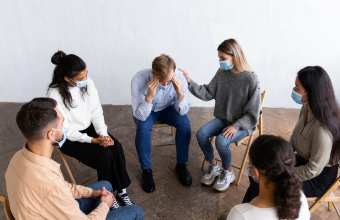Welcome To My Mentor Advisor
-
-
-
No 41 , Star City, Theethi Palayam, Coimbatore, Tamil Nadu 641010.
Welcome To My Mentor Advisor
No 41 , Star City, Theethi Palayam, Coimbatore, Tamil Nadu 641010.
Group therapy is a therapeutic practice that involves a small group of individuals who meet regularly to discuss their experiences, challenges, and emotions under the guidance of a trained facilitator or therapist. This setting fosters a supportive environment where participants can share their stories, gain insights from others, and learn from diverse perspectives. Group therapy can address various issues, including anxiety, depression, relationship problems, and trauma, allowing members to feel less isolated in their struggles. Through interactions and shared experiences, individuals can develop social skills, receive feedback, and build a sense of community, ultimately enhancing their personal growth and healing. Additionally, the dynamic of group interactions can promote the development of social skills, enhance self awareness, and improve communication abilities. Participants often benefit from receiving feedback from peers, which can lead to increased empathy and understanding. Furthermore, group therapy can serve as a cost effective treatment option, making mental health support more accessible.
Group therapy offers numerous benefits that enhance the therapeutic experience for participants. One of the primary advantages is the sense of community and belonging it fosters, helping individuals feel less isolated in their struggles. Sharing experiences in a supportive environment encourages empathy and understanding among members, allowing them to gain different perspectives on their challenges.
Overall, group therapy can be a powerful complement to individual therapy, facilitating personal growth and emotional resilience.
Group therapy can provide a safe space for participants to explore and confront difficult emotions, facilitating emotional processing and healing.
The presence of a trained facilitator ensures that discussions remain constructive and that everyone’s voice is heard, promoting a balanced dynamic.
Group therapy is led by a trained therapist who guides discussions, ensures a safe environment.

Participants have the opportunity to share their personal experiences and challenges with others.

Group therapy emphasizes the learning with the development of social and interpersonal skills.

Group therapy involves a small group of individuals sharing their experiences and challenges under the guidance of a trained therapist. This supportive environment fosters connection, personal growth, and the development of interpersonal skills.
Group therapy can be specialized in various areas to address specific needs and challenges faced by individuals. For instance, substance abuse groups focus on supporting individuals in recovery, providing strategies for coping with addiction and building a sober community.
Cognitive behavioral therapy groups teach participants techniques to manage thoughts and behaviors related to specific challenges.
These specializations ensure that group therapy can effectively meet the diverse needs of participants, promoting healing and personal growth.
Intelligence in group therapy refers to the collective emotional and social awareness that emerges among participants, contributing to a richer therapeutic experience. This form of intelligence encompasses the ability to empathize, communicate effectively, and understand the dynamics of the group. Participants often bring diverse perspectives and life experiences, which can enhance problem-solving and foster deeper insights.
This shared intelligence not only helps individuals feel validated and understood but also encourages personal growth and resilience.
They cultivate an environment where collaborative learning and healing can thrive, making the therapeutic process more impactful and transformative.
Guidance in group therapy is a crucial element that helps facilitate meaningful discussions and promote a supportive environment. Led by a trained therapist or facilitator, this guidance involves setting clear objectives for the group, establishing ground rules, and ensuring that every participant feels safe and heard.
The therapist plays an active role in steering conversations, addressing conflicts, and providing constructive feedback, which helps maintain a productive atmosphere.
Effective guidance enhances the therapeutic process, allowing members to benefit from the collective wisdom and support of the group.
Super support in group therapy refers to the robust network of encouragement and understanding that participants provide each other throughout the therapeutic process. This supportive environment allows individuals to express their vulnerabilities and challenges without fear of judgment, fostering a sense of safety and belonging.
This mutual support not only helps individuals process their emotions but also builds resilience and confidence as they navigate their personal journeys.
Super support in group therapy enhances the overall healing experience, promoting deeper connections and facilitating transformative growth.
Quality services in group therapy are increasingly designed to be more accessible, ensuring that a wider range of individuals can benefit from psychological support. This accessibility can take various forms, including lower costs per session compared to individual therapy, which makes mental health care more affordable for many. Group therapy settings also foster a sense of community, which can be particularly helpful for individuals who might feel isolated or hesitant to seek help alone.
Many therapists offer online group sessions, allowing participants to join from the comfort of their own homes, thus eliminating barriers such as transportation and geographical limitations.
This approach not only broadens the availability of quality mental health resources but also promotes a collaborative healing experience, ultimately enhancing the overall effectiveness of therapeutic interventions.
Our approach in group therapy emphasizes a holistic and inclusive framework that prioritizes the unique needs of each participant while fostering a supportive community environment. We believe that sharing experiences and perspectives can catalyze healing, so we create a safe space where individuals feel comfortable expressing their thoughts and emotions. Our trained facilitators employ evidence based therapeutic techniques tailored to the group's dynamics, encouraging open dialogue and active participation. We emphasize the importance of mutual support, where members not only share their journeys but also learn from one another, building resilience and enhancing interpersonal skills.

